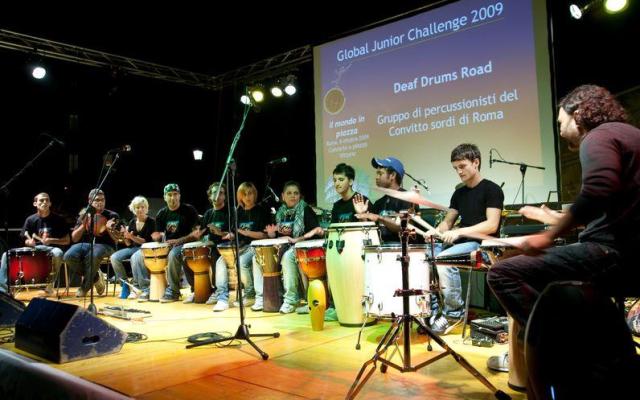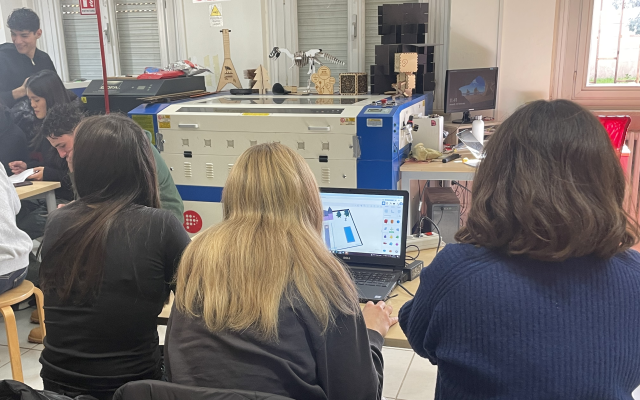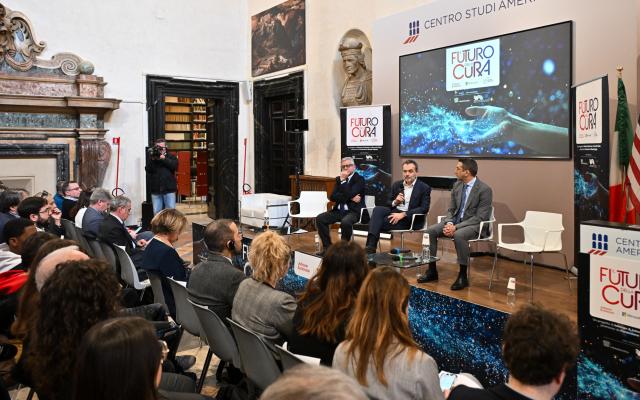4 min.
From the “Schools” section of Redattore sociale:
Digital Bridge: the results of the Fondazione Mondo Digitale’s Project were presented during the “digital bridge” between Africa and Italy with the participation of 11 Roman schools in videoconference with their African counterparts.
ROME – More than 500 students livened the atmosphere in the Lazio Region today for the presentation of the results of Project Digital Bridge coordinated by the Fondazione Mondo Digitale and financed by the Lazio Region.
The protagonists are the students from 11 Roman schools and those from the district of Fontem in Cameroon and from the Saharawi Refugee Camps, who have been involved in the project developed by SIR, Bambini+Diritti onlus and the Lebialem Association for Twinning of Schools (Lats), an association that has promoted education and intercultural exchange programmes for youth in the Lebialem Region since 1990.
“The vast participation and presence of all this youth witnesses the fact that this if more than a traditional conference. This is the image of the future,” declare Alfonso Molina, Scientific Director of the Fondazione Mondo Digitale. “We face a multi-faceted reality that is never univocal and rich of interactions. Many of the key points of society are being transformed. Schools have stepped beyond traditional instruction to provide a more social and innovation-oriented education.”
This is witnessed by the fact that the project aims to create a “digital bridge” amongst Roman schools and those in Cameroon and Saharawi through the use of innovative technology, the exchange of materials and knowledge, twinning and on-line training. In fact, the meeting itself is testimony to the relations that have developed thanks to Digital Bridge.
The videoconference involved the teachers and students who participated in the project as well as all the institutions that support exchange and new technologies. Omar Mih, Representative of the Polisario Front in Italy, confirmed this: “The most terrible situation is isolation. I am certain that this twinning will help us feel less alone.” Even Martin Nkafu, President of LATS, underlined the importance of creating bonds and connections, especially in terms of education “in territories that often have no connections, not even of an infrastructural nature.”
While the African institutions were fully present, the same cannot be said about the Italian authorities, Prof. Molina lamented. There is “an institutional incapability to understand the mechanism of reality that is composed by exchange and innovation. This project,” he added, “is a testimony of the fact that when we invest in the future we can achieve important objectives. The Lazio Region, in synergy with innovating teachers, has developed an important project for Italian schools and a vital one for African schools.”
In Cameroon, now that 16 technical operators have been trained, a lot of burocratic requirements are completed on-line and students study computer science and Italian on-line.
The Saharawi, some of whom were guests in Italy during the summer, now have two computer labs in the Aaiun and Ausserd Refugee Camps as well as a high school. “Nearly 100% of the Saharawi are schooled. They believe that international attention they can garner is directly related to the education of their youth,” explains Giovanni Intini, technical manager for the project. “Unfortunately, however, the students have to leave their family and move to Lybia, Algeria or Cuba to study as there are no secondary schools in the refugee camps. Now, everyone will be able to attend school without having to move away.”
Moreover, the project has “helped train teachers via web, especially in terms of new technologies. This means that the Saharawi will have better tools to draw attention to their plight.” In fact, Intini launched the initiative that has been championed by the Bambini+Diritti association that allows students and teachers to spend a week at the refugee camps. “Thanks to this experience,” says I. Newton high school student Almira Licina, “I became acquainted with very warm and intelligent people and was able to fully comprehend their situation and the political issues that surround it.” Almira was one of the students who travelled to the refugee camps last year.
“Projects like Digital Bridge,” emphasises Almira, “are important because they allow us not only to understand the dynamics of the refugee camps, but also have real exchanges with persons and situations that we would otherwise never have come to know about.” (Serena Chiodo)



